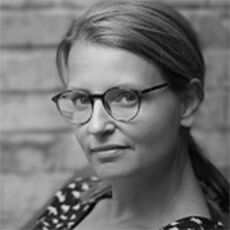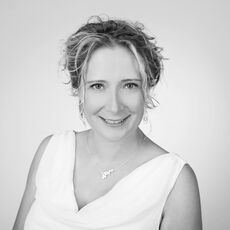Thomas Mann House Events Archive
June 2023
Poetry with Ghayath Almadhoun
Goethe-Institut Washington, D.C. (1377 R St. NW Ste. 300 Washington, DC 20009)
Join Thomas Mann Fellow Ghayath Almadhoun for an evening of poetry on war, empathy, displacement, suffering, love, and hatred. More information coming soon!
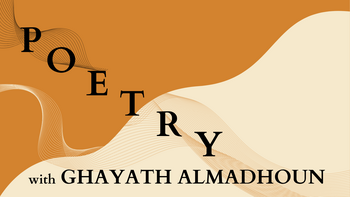
Ghayath Almadhoun is a Palestinian poet born in Damascus, Syria, who emigrated to Sweden in 2008 and now lives in Berlin. He published four poetry collections in Arabic, and his work has been translated into dozens of languages. Ghayath Almadhoun collaborated with other poets and artists, and his poetry has been part of the work of U.S. artist Jenny Holzer, German musician Blixa Bargeld, and others. His latest collection Adrenalin, published in English by Action Books 2017, was among the SPD Poetry Bestsellers in the U.S. and nominated for the 2018 Best Translated Book Award. His selected poems Ein Raubtier namens Mittelmeer ("Predator called the Mediterranean") ranked top of the Litprom-Bestenliste 2018 of best books translated into German.
Attendance Information:
RSVP here
The admission is free.
Location:
Goethe-Institut Washington
1377 R St. NW Ste.
300 Washington, DC 20009
Affective Landscapes – Photography & Cinema of the American West: Carolin Görgen, Heike Paul & Jordan Reznick in Conversation. Moderated by Erin Cooney.
Thomas Mann House (1550 N San Remo Dr, Pacific Palisades, CA 90272)
Thomas Mann Fellows and American Studies scholars Carolin Görgen and Heike Paul engage in a conversation with photo historian and photographer Jordan Reznick about the history and present of visual cultures associated with the American West. The conversation will be moderated by L.A.-based visual artist and educator Erin Cooney.

For a long time, Californian landscape photography and U.S. environmentalism have been inextricably related in the public imagination. The monumental vistas of Carleton Watkins, Ansel Adams, and many others have suggested that aesthetically-pleasing prints would fuel environmental awareness. Yet, California’s long history of mineral extraction, railroad enterprise, and violent displacement of Indigenous populations — and their connection to the photographic medium — complicates these wishful representations. Did popular photography, such as the practices of the California Camera Club, leave an ecological imprint on the land that is tangible to this day?
2023 Thomas Mann Fellow Carolin Görgen explores these and other questions around the political ecologies of the Western camera. Interesting overlaps and synergies arise in connection with the work of the American Studies scholar Heike Paul, who was a 2022 Fellow at the Thomas Mann House. Paul, whose research deals intensively with film, offers fascinating insights into ideas of Western frontiers and myth-building: The American West has long been the site of Western films and melodramas: Melodramas of introspection, of encounter, conflict and triumph, unfold against a grandiose landscape reinforcing notions of good and evil and, above all, “Americanness.” Traditional cinematic melodramas of tormented manhood have recently given way to more complex and nuanced forms of identity politics in films such as Power of the Dog (2021) and television series such as Godless (2017). Do these revisionist new types of 'anti-Westerns' change how we politically and aesthetically perceive the American West as an affective landscape? Jordan Reznick, a photographer and art historian who focuses on the interrelations between photography, race, transgender studies, and settler colonialism, will join the conversation. In their work, Reznick’s trans feminist lens replaces the objective facticity of the photograph with the truth of affect and the honesty of the relationship between subject, photographer, and viewer. Reznick’s series of landscape photography, Seeing Settler Seeing (in progress), reinterprets survey photographs of the Los Angeles Aqueduct, in which water stolen from the Indigenous Owens Valley Paiute land flows to Los Angeles.
Against the backdrop of the Thomas Mann House annual topic on the relationship between arts and politics, the three speakers will engage in a conversation about past and present implications of visual cultures of the American West, drawing on their various disciplinary backgrounds. The conversation will be moderated by Erin Cooney.
Attendance by invitation only.
Participants

Carolin Görgen is an Associate Professor of American Studies at Sorbonne Université, Paris. After studying American Studies and Art History in the Netherlands, the US, and France, she obtained her PhD from the University Paris-Diderot and the Ecole du Louvre in 2018. Her research focuses on the photographic history of California and the American West. Her work has received support from the Terra Foundation for American Art, the Beinecke Library at Yale, the Huntington Library, and the Amon Carter Museum. She serves on the editorial board of the journal Photographica. Among many other publications, Görgen is the author of the 2021 article “Californian Women Photographers in the U.S. Archival Landscape: Toward a More Inclusive History of American Photography.” She is a 2023 Thomas Mann Fellow.

Heike Paul is Professor of American Studies, with a focus on North American literature and Cultural Studies at the University of Erlangen-Nuremberg. Her research interests in the field of a culturally hermeneutically oriented American Studies deal, among other things, with cultural patterns of community formation in the United States. In 2018, she was awarded the Leibniz Prize. Paul is a member of the Bavarian Academy of Sciences and Humanities and director of the Bavarian American Academy, in which she is deeply committed to transatlantic networking. Her publications include American Civil Sentimentalism (2021), The Myths That Made America (2014), and, most recently, the Lexicon of Global Melodrama (2022).

Jordan Reznick is a photo historian and photographer as well as a GRI/NEH Postdoctoral Fellow at the Getty Research Institute. They will join Grinnell College as an Assistant Professor of American Studies in the fall. Their current research project describes how Indigenous ecological science shaped nineteenth-century landscape photographs in California. Reznick’s publications include “Through the Guillotine Mirror: Claude Cahun’s Photographic Theory of Trans against the Void” in Art Journal (2022) and “Indigenous Space: Hodinöhsö:ni’ Sky World and the Territories of American Art” forthcoming in American Art (2023).

Erin Cooney is a visual artist and educator based in Los Angeles. Her video, installation, and performance work investigates point of view and its role in determining the kind of worlds we experience and build. Erin is a Lecturer in UCLA’s Design Media Arts Department and is an Affiliated Faculty to UCLA’s Counterforce Lab, which uses art and design to engage with ecological crisis and its ties to environmental injustice. Erin received a BA in Philosophy from the University of Notre Dame, studied Graphic Design at Art Center College of Design, and received an MFA from UCLA in Design Media Arts.
Attendance Information:
By invitation only.
Location:
Thomas Mann House
1550 N San Remo Dr
Pacific Palisades, CA 90272
Ecologies of the Western Camera: Photographic Practice in Early Twentieth-Century California. Lecture by Carolin Görgen
Huntington Library | Munger Research Center
2023 Thomas Mann Fellow Carolin Görgen (Sorbonne University) discusses the role of Californian photographers in the early twentieth century, questioning the common portrayal of western artist-explorers at the backdrop of imperialist expansion.
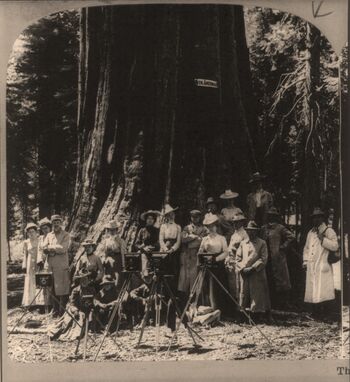
For the past century, Californian photographers have existed in our imaginations as environmentally aware practitioners whose majestic depictions of the western landscape have helped preserve and protect the state's fragile ecosystem. Exploring the practices of the largest camera club in the early twentieth-century U.S. – the San Francisco-based California Camera Club – this talk questions the common portrayal of western artist-explorers in a seemingly favorable climate. It draws attention to the ecological repercussions of photographic practice in California, c. 1900, by tracing the tensions between aesthetically pleasing landscape imagery and its material afterlife.
Thanks to a variety of photographic objects and manuscripts, many of which residing at the Huntington, Carolin Görgen will examine how the club’s seemingly preservationist agenda was interwoven with imperialist expansion, Indigenous dispossession, and often-violent transformation of the land. In dialogue with recent ecocriticial research, she will ask how the photographers’ dominant understanding of the Western environment was directly linked to the social fabric of the club and longstanding imaginations of Californian photography as inherently environmentalist.
The event is open to the public. No reservations needed.
Participants

Carolin Görgen is an Associate Professor of American Studies at Sorbonne Université, Paris. After studying American Studies and Art History in the Netherlands, the US, and France, she obtained her PhD from the University Paris-Diderot and the Ecole du Louvre in 2018. Her research focuses on the photographic history of California and the American West. Her work has received support from the Terra Foundation for American Art, the Beinecke Library at Yale, the Huntington Library, and the Amon Carter Museum. She serves on the editorial board of the journal Photographica. Among many other publications, Görgen is the author of the 2021 article “Californian Women Photographers in the U.S. Archival Landscape: Toward a More Inclusive History of American Photography.” She is a 2023 Thomas Mann Fellow.
Attendance Information:
This event is free and open to the public. No reservations required. Space is limited.
You are welcomed to bring and eat your own lunch.
Location:
Munger Research Center – Seaver Classroom 1 & 2
1151 Oxford Rd, San Marino, CA 91108
Carpool Community Engagement – How Civil Society Shapes L.A.’s Neighborhoods: Part II (Video Release)
Online
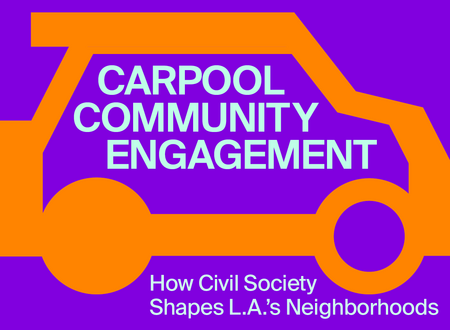
During their Fellowships at the Thomas Mann House, historian and innovation researcher Rubina Zern-Breuer and Swenja Zaremba, research associate at the Centre for Cultural and General Studies at the Karlsruhe Institute of Technology, focused on meaningful interactions between public administration and civil society. The two met with a variety of activists, social workers, and community organizers to talk about their practices and experiences in the City of Los Angeles. From infrastructural challenges to problems with racism, housing, gang criminality and poverty: How can local participatory approaches strengthen trust, help individuals and repair urban infrastructures? What transformative potential for public organizations as well as for civil society networks can these approaches hold? Together with their guests, they explore how collaborative approaches on the local level can effect communities – and what we can learn from them for Germany in terms of trust and collaboration.
Join Rubina and Swenja in the Thomas Mann House van on their tour through different Los Angeles communities! Learn more about the different approaches, methods, projects and civil society initiatives and how they make a difference in the city.
Episode 2 includes interviews and tours with Kiara Aileen Machado, Visual Artist, Paul Vandeventer, Founder of Community Partners, and Fredid Toledo, Administrative Assistant at Homies Unidos.
Don't miss our first series of interviews in Part I with Jordan Wynne (United Way of Greater Los Angeles), Blair Imani (Author & Activist), and Tony Brown (Heart of Los Angeles)!
Watch Part II Here:
Watch Part I Here:
Participants
